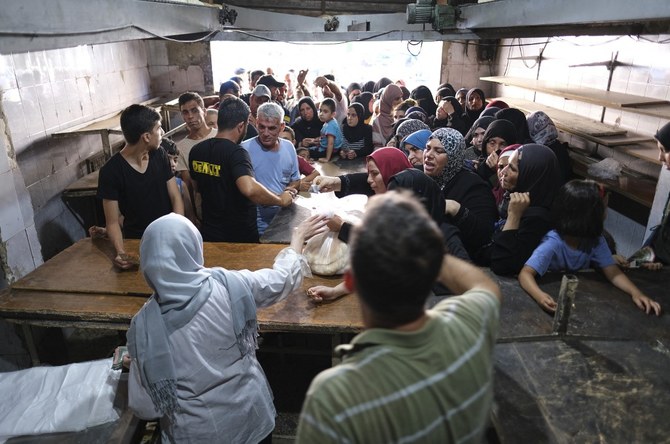World Financial institution ‘Ponzi Finance’ report is damaging each to Lebanon and the financial institution itself

The publication this month of a World Financial institution report on Lebanon, which presents a damning account of monetary and monetary coverage within the nation over the previous 30 years, raised many eyebrows.
Anybody studying it will come to the conclusion that the Lebanese introduced the present disaster upon themselves by way of misguided and irresponsible monetary maneuvers. In a state that’s struggling to regain the belief of its personal inhabitants, in addition to that of the worldwide neighborhood, the report, if taken significantly, represents a big setback.
The content material of the report — titled Lebanon Public Finance Evaluate: Ponzi Finance? — is kind of rigorous and exact. The general message and ideological bias are debatable and could possibly be dangerous to the nation. The language, authorship and conclusions are damaging to the World Financial institution itself, elevating large questions concerning the course of of manufacturing such a report and, most significantly, concerning the World Financial institution’s personal function over the previous 30 years in supporting such damaging insurance policies and collaborating of their formulation. The financial institution was a associate to successive Lebanese governments and financed many of the tasks talked about within the report.
Barely three years earlier than the present disaster started, the autumn 2016 version of the World Financial institution’s Lebanon Financial Monitor was stuffed with reward for what it described because the proactive insurance policies of Banque du Liban, the nation’s central financial institution.
Certainly, the World Financial institution and the Worldwide Finance Company offered loans and grants, in addition to technical help, for the packages and measures the report mentioned intentionally led to catastrophic outcomes. If the report is appropriate and there was a “Ponzi scheme” and a “deliberate melancholy,” then the World Financial institution was an energetic associate in each and bears a big share of duty for the outcomes.
What seems much more puzzling concerning the report is the activist tone and populist language, that are a radical departure from the conventional dry, robotic jargon of Washington forms. Since when does a World Financial institution report begin with a “message to the Lebanese folks,” informing them that the lack of their financial savings was the results of deliberate measures applied by the institution with the intent of impoverishing them.
The title, “Ponzi Finance,” is itself fairly sensationalist and irresponsible, if not patronizing
Nadim Shehadi
Certainly, the authors appear happy with their slogan “deliberate melancholy” and repeat it a number of instances within the preface, with italics for emphasis. The title, “Ponzi Finance,” is itself fairly sensationalist and irresponsible, if not patronizing.
The analytical conclusions and coverage suggestions contained within the report contradict one another. If the financial institution thinks that is proper, they can’t on the identical time have the structured program they applied within the nation.
The populist language and tone develop into far much less of a puzzle, nevertheless, once we take into account the workforce that was entrusted with authorship of the report; as a substitute, it’s the judgment behind the World Financial institution’s alternative of such a workforce that’s perplexing.
The report was developed in collaboration with Charbel Nahas, who’s described as a professor of political economic system and public coverage on the American College of Beirut. He was assisted by a workforce of three researchers who’re members of his political occasion, Residents in a State. Two of them stood with him as candidates for the occasion within the 2018 elections. They collaborated with the Lebanese Citizenship Basis, headed by Alain Bifani, and had the help of a lot of World Financial institution employees each in Lebanon and in Washington.
Each Nahas and Bifani have been energetic in, and essential pillars of, the very system they now criticize. They had been each candidates for the Beirut municipal elections in 1998 underneath the banner of the Free Patriotic Motion of Gen. Michel Aoun, the present president of the republic. They had been each advisors to Gen. Emile Lahoud when he was president, and near Gen. Jamil Al-Sayyid when he was head of the Basic Safety Directorate.
Nahas held cupboard posts twice on behalf of the FPM, in two consecutive governments: He was telecommunications minister between November 2009 and June 2011, and labor minister from June 2011 till February 2012.
In a televised assertion he reminded President Aoun, with whom he had fallen out, how in 2011 he (Nahas) held conferences with Bifani, MP Ibrahim Kanaan, Gibran Bassil, who’s now chief of the FPM, and Riad Salame, head of the central financial institution, and had agreed to “blow up” the system.
Bifani, in the meantime, was director basic of the Ministry of Finance for 20 years till he resigned in 2019. He was additionally a member of the board of the central financial institution and headed the federal government’s Debt Administration Unit when it was established in 2008. He signed on for all budgets and debt operations and was the highest-ranking official with the angle of each the ministry of finance and the central financial institution, and had full information of fiscal and financial operations. There isn’t a approach he can cross as a impartial observer.
Think about the scandal if the World Financial institution adopted a political occasion in any nation apart from Lebanon and offered it with the assets and backing, in addition to its endorsement and the credibility of its institutional help, to provide its personal political manifesto. If the World Financial institution is to use the precept of even-handedness, it must do that in different nations within the area, similar to Turkey, Syria, Iraq or Yemen. The factors for selecting which events to help could be attention-grabbing.
In reality, it will be fairly a coup if radical Western politicians similar to Bernie Sanders within the US or Jeremy Corbyn within the UK managed to get the World Financial institution to throw its weight behind their political careers. Like Nahas, they’re each charismatic figures and have a big following amongst millennials.
Nahas went one step additional; he publicly requested Sayyid Hassan Nasrallah, the secretary-general of Hezbollah, at hand over energy to him and his occasion and sponsor him as short-term chief of the nation in order that he might repair it. Nasrallah didn’t fall for this and nor did the voters in 2018 — however apparently the World Financial institution did.
• Nadim Shehadi is a Lebanese economist. Twitter: @Confusezeus
Disclaimer: Views expressed by writers on this part are their very own and don’t essentially mirror Arab Information’ perspective



